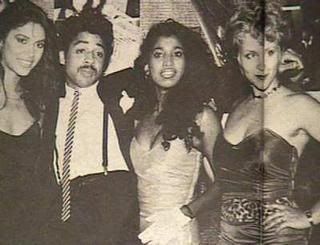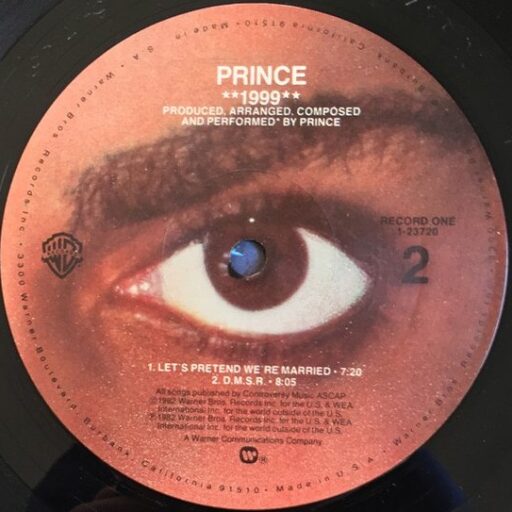As noted earlier, Prince began work on the Time’s second album during a three-week break from the Controversy tour, where the group was serving as his opening act and occasional thorn in his side. It thus makes sense that what would become the album’s opening track, “Wild and Loose,” centered around one of the most prevalent scenarios in the life of a touring musician: the backstage (and back-of-bus) dalliances between the band and their young, female admirers.
Just as he had with the Time’s earlier song, “Cool,” Prince tapped his own band’s guitarist, Dez Dickerson, to help write the song. “Prince called me on the phone with a song title,” Dickerson told the alt-weekly Nashville Scene, “and about 15 minutes later, I called him back with lyrics based on the title” (Shawhan 2014). Dez, who had spent years touring in journeyman rock groups before linking up with Prince, had more familiarity with the rock ‘n’ roll lifestyle than anyone else in the camp. But his take on the song “kept the content rated G,” as he later recalled, so “Prince altered it somewhat from my original version” (Dickerson 205). The final lyrics, when viewed from a contemporary lens, seem calculated to shock and titillate: “Hangin’ by the backstage door, decked out like a queen / Your body’s sayin’ 21, but your face says 17.”

Songs about young men pursuing younger girls have a long history in popular music, particularly the teen-oriented genre of rock ‘n’ roll: from Chuck Berry’s “Sweet Little Sixteen” to the Beatles’ “I Saw Her Standing There” (“Well, she was just 17 / If you know what I mean”) to Gary Puckett and the Union Gap’s “Young Girl.” By early 1982, even Prince had his own entry in the subgenre, the as-yet-unreleased “She’s Just a Baby”–inspired by his own barely-legal girlfriend at the time, future Vanity 6 member Susan Moonsie. But today, much like the tasteless “easy access” joke in “The Walk,” a line like “Tell your mama we won’t be home, ’cause we got plans for you” is much more difficult to stomach–particularly in the wake of renewed accusations against notorious R&B singer/sexual predator R. Kelly, who literally has separated young women from their families in a bizarre, cult-like arrangement.
None of which, of course, is meant to draw any parallels between Prince and Kelly–or even Prince and Berry, who was notoriously convicted in 1959 for transporting a minor across state lines for “immoral purposes.” I point it out, instead, to illustrate what a comparative non-issue the idea of grown men pursuing teenage groupies was in the context of early-’80s pop culture. Stories like Led Zeppelin guitarist Jimmy Page effectively abducting 14-year-old groupie Lori Mattix, or Ted Nugent becoming the legal guardian of 17-year-old Pele Massa in lieu of a marriage, were treated as lurid tales of rock ‘n’ roll excess–rather than, as they would be today, instances of child sexual abuse.

In other words, justifiably or not, “Wild and Loose” was received as merely another good-time funk jam in the Time’s growing catalogue: titillating, perhaps, but hardly shocking. As an album opener, it’s inspired. Singer Morris Day bellows the band’s catchphrase (and the album’s title), “What time is it?!”, followed by a hammered-out single-chord funk riff by Prince, his bass and Day’s drums pumping like pistons beneath. They keep up the groove for seven and a half minutes, with a machinelike precision interrupted only by the occasional drum fill, synthesizer swell, or percussive keyboard line. Toward the end, Prince cuts loose with a squirming synth solo seemingly inspired by Dr. Fink’s work on the Time’s “Get It Up” and his own “Head.” “Wild and Loose” is in its own way as monolithic and monstrous as the similarly-structured “Controversy”: a futuristic melding of James Brown’s grit with Kraftwerk’s smooth lines and gleaming surfaces.
Indeed, the song’s only real flaw is its lyrical conceit, for which “problematic” is the most charitable descriptor. It isn’t just that Morris/Prince is leering at a girl he presumes (hopes?) to be underage; he’s also a flagrant dick about it, purring a promise of discretion to his conquest immediately before turning to guitarist Jesse Johnson and cackling, “come here, man, guess what I did last night!” Later, he tries to cajole the girl with what in contemporary parlance we would call slut-shaming: “Baby, you ain’t no saint, ’cause there ain’t no in-between / Either you come or you can’t, now get loose, let me hear you scream.” Increasingly, Morris and the Time were becoming an outlet for not only Prince’s more conventionally R&B-styled music, but also his worst sexist impulses–a trend that would reach its peak with the infamous dumpster scene in Purple Rain.

But for now, just as he had on “The Walk,” Prince softens the sexism of “Wild and Loose” with a humorous skit featuring Moonsie and his ex-girlfriend Kim Upsher. The ladies play the role of giggling schoolgirls swooning over the members of the Time: “Did you see Jesse’s eyes, aren’t they pretty?” “No one at school will ever believe I talked to Morris on the phone last night!” At one point, an awkward young man tries to cut in and invite them to a party; their brutal rejection sends him away with his tail between his legs. Finally, Susan interjects with what could equally be an exciting observation or a chilling warning: “Kim, you ain’t gonna believe it, the guys from the Time are right behind you.”
The ensuing conversation between Kim and Morris is, on one level, more mean-spirited misogyny: Kim reminds Morris that they talked on the phone last night and he gives her the brush-off, sneering, “Is that right? Well, you sure don’t look like you sound.” But Prince gives Kim the last word, as she drops the doe-eyed groupie act and goes for the throat: “Jerk! That was the worst concert I’ve ever been to!” Whether meant to poke a hole in the rest of the song’s callousness, or merely to throw some shade on a group of mentees who were rapidly outgrowing their britches, Kim’s clapback has the effect of edging “Wild and Loose” onto the right side of the line between comedy and cruelty.
Much like “Bambi,” though, the musical virtues of “Wild and Loose” ultimately outweigh its lyrical vices. Prince certainly couldn’t stay away, revisiting the song as an interpolation in a 2012 version of the mid-’90s live staple “Days of Wild” alongside snippets of “America,” the New Power Generation’s “Get Wild,” and “Ain’t Nobody” by Rufus and Chaka Khan. The jam, rechristened “Days of Wild and Loose,” resurrects the song’s call-and-response chant (“Fellas, where the party at?” “Right here under your shoes”) and renders the first verse as a rap. And yes, even at age 54, Prince kept the “body’s sayin’ 21” line–for better or worse, some things never change.
(Quick update while I have you all here: I’m over my illness, which actually turned out to be a bout of pneumonia, so you should see things start to pick up around here. If you haven’t already, check out my interview with Prince’s Friend on YouTube, and try not to stare too much at my raw, cracked lips. Earlier this week, Prince’s Friend posted a video called “Prince Was a Modern Day Sage” that is worth checking out. It might seem strange for me to link to a video about Prince’s words of wisdom at the end of a post where I’m mostly taking him to task for some of his less-wise words, but the video makes the important point that Prince was a human being, with all the flaws that entails; that’s definitely something I try to keep centered in my own work on this blog, whether I’m being effusive with praise or a little more critical.)
“Wild and Loose”
(The Time, 1982)
Amazon / Spotify / TIDAL
“Days of Wild and Loose”
(Rehearsal, 2012)
Facebook

Leave a Reply